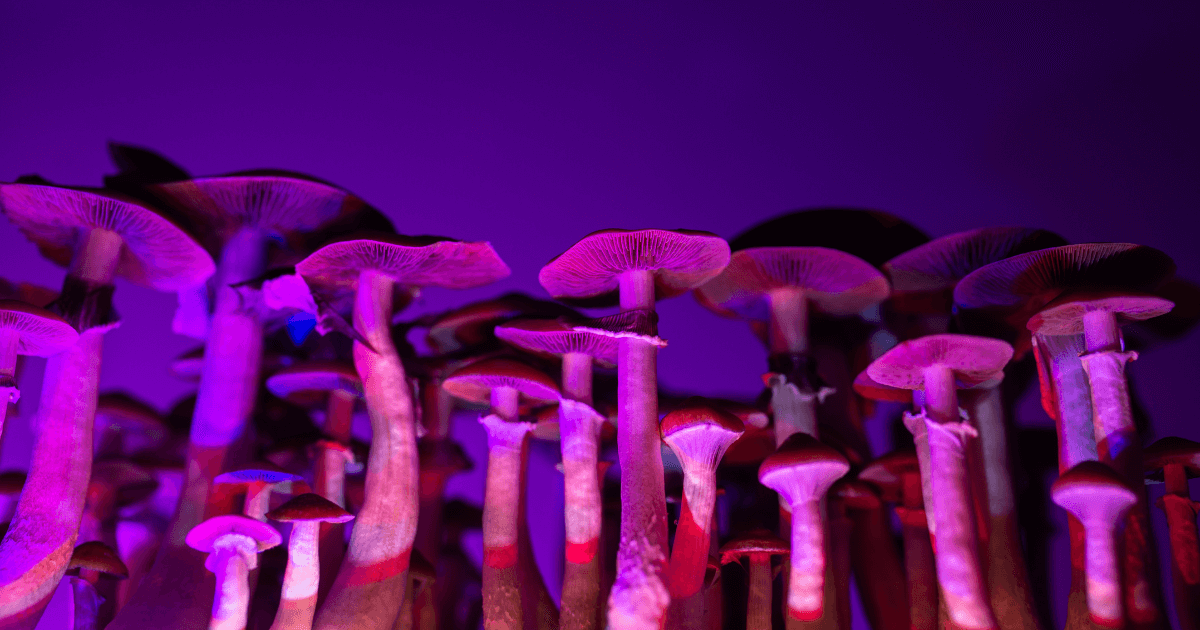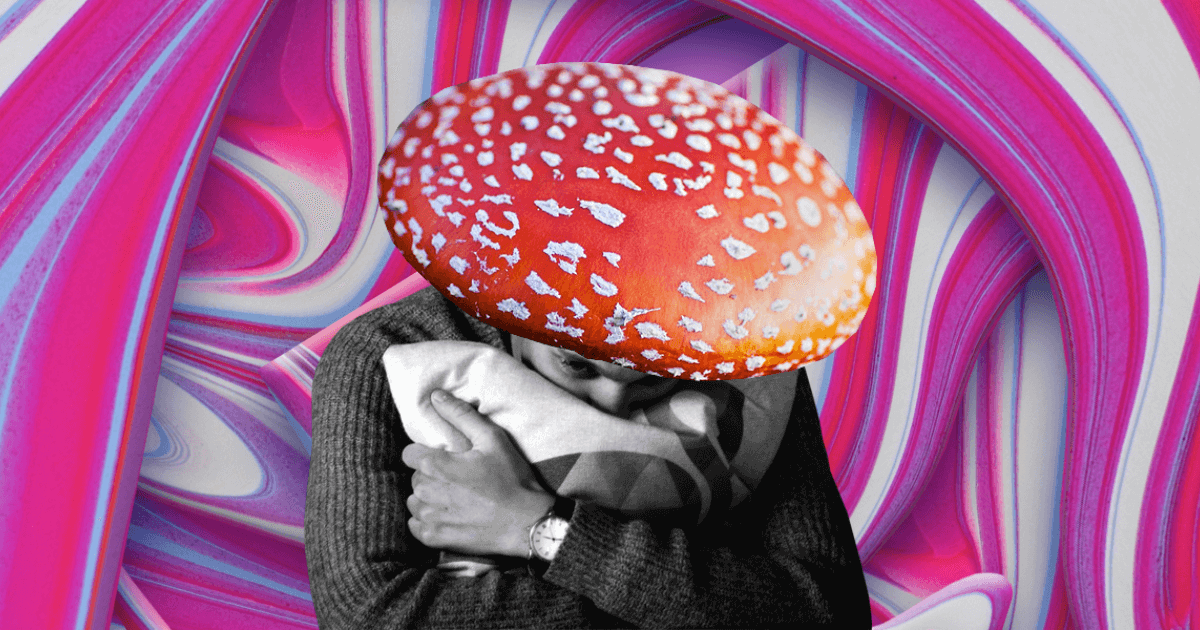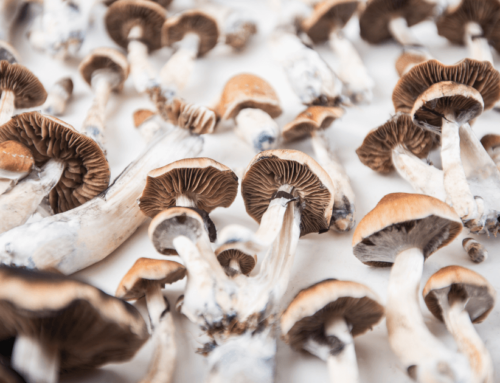Psilocybin is a naturally occurring psychoactive substance found in certain types of mushrooms, which are commonly referred to as “magic mushrooms.” It is a member of the tryptamine family of compounds and is structurally similar to serotonin, a neurotransmitter found in the brain.
Psilocybin is known for its ability to produce altered states of consciousness, including changes in perceptions, thoughts, and feelings. It is considered to be a hallucinogenic drug, as it can cause hallucinogenic effects or altered perceptions of reality.
In this article, we’ll discuss the natural hallucinogen that is psilocybin and its hallucinogenic effects. We’ll also talk about psilocybin-containing mushrooms, the benefits, and possible side effects of magic mushrooms. Prepare yourself to be able to buy shrooms online in Canada with confidence!
What are Psilocybin Mushrooms?
Psilocybin mushrooms, also known as magic mushrooms or shrooms, are a type of fungus that contain the psychoactive compound psilocybin. They are typically found in warm and humid regions of South America. They are often consumed for their ability to produce altered states of consciousness, including changes in perceptions, thoughts, and feelings.
Psychoactive mushrooms can be found in a variety of shapes, sizes, and colours and are often distinguished by their specific physical characteristics, such as the presence of dark gills on the underside of the mushroom cap. Hallucinogenic mushrooms are usually ingested orally by eating whole dried mushrooms, brewing fresh mushrooms into a tea or taking magic mushrooms as a capsule.
Note that there are poisonous mushrooms that look like psilocybin varieties. If you consume a poisonous mushroom, it could kill you—or at least damage your liver. Mushroom poisoning can also cause increased blood pressure, muscle weakness, and panic reactions.

What Does Taking Psilocybin Shrooms Feel Like?
The effects of taking mushrooms can vary greatly from person to person. Some common experiences that people may have after taking psilocybin mushrooms include:
- Altered sensory perception of reality
Psilocybin can alter the way a person perceives the world around them, including sights, sounds, and other sensations. This can result in frightening hallucinations, auditory hallucinations and altered perceptions of reality.
- Changes in thoughts and emotions
Psilocybe mushrooms can also affect the way a person thinks and feels. Some people may experience a change in their emotional state, such as feeling more open, empathetic, or introspective.
- A feeling of unity or connectedness
Some people report feeling a sense of unity or connectedness with the world or with other people while under the influence of psilocybin-containing mushrooms.
- Physical effects
Psychedelic mushrooms can also cause physical effects, such as an increased heart rate, dilated pupils, and nausea.
Keep in mind that the intensity and duration of the effects of magic mushrooms can vary greatly depending on psilocin concentrations, the individual’s personality, mood, surroundings, and other factors.
Benefits of Psilocybin Mushrooms
There is limited scientific research on the potential benefits of psilocybe mushrooms, as they are a controlled substance and are illegal in Canada. However, psychedelic and consciousness research suggests that psilocybin use may have certain therapeutic effects and help treat certain conditions.
Here are a few examples of potential benefits of psilocybin mushrooms that have been suggested in research:
- Treatment of depression symptoms
Some studies have suggested that psilocybin and psilocin may be effective in reducing symptoms of depression in people who have not responded to other drugs.
- Treatment of Anxiety
Psilocybin may also be helpful in mental health, particularly in reducing anxiety in people with life-threatening illnesses.
- Addiction treatment
Psilocybin has been shown to effectively reduce cravings and improve treatment outcomes in people with addiction to substance abuse, such as alcohol and tobacco.
- Psilocybin Therapy
Psilocybin therapy, also known as psilocybin-assisted therapy, is a form of treatment that involves the use of psilocybin in combination with psychotherapy. Psilocybin therapy is being researched as a potential treatment for a range of mental health conditions, including treating depression, anxiety, and addiction.
The goal of psilocybin therapy is to help the person gain insight and understanding into their condition and make positive changes in their life. While psilocybin therapy is still in the early stages of research, clinical studies have shown promising results regarding its effectiveness and safety. However, more research is needed to fully understand the potential benefits and risks of psilocybin therapy.
It is important to note that these potential benefits of shrooms are still being researched and are not fully understood. It is generally not recommended to use psilocybin mushrooms or other psychotropic substances without a legitimate medical purpose or the guidance of a qualified healthcare professional.

Side Effects of Psilocybin Magic Mushroom
Magic mushrooms can produce a range of effects on the body and mind. While some psilocybin users may find these effects enjoyable, others may experience adverse effects or a bad trip.
Physically, psilocybin can cause increased heart rate, high blood pressure, and body temperature, as well as nausea and vomiting.
Psychological consequences of psychedelic drugs include anxiety, paranoia, and psychosis, as well as impaired judgment and coordination. In some cases, these effects can be intense and unsettling, leading to a phenomenon known as a “bad trip.”
Note that the severity and likelihood of these adverse effects can vary depending on the individual and the dosage. As with other psychedelic drugs, it’s important to be mindful of the risks and to take appropriate precautions when using mushrooms psilocybin.
Where to Buy Psilocybin Magic Mushrooms Online in Canada?
Buy shrooms online in Canada at Weed List. WeedList is a premium dispensary where you can find a huge selection of cannabis products, including magic mushrooms and can even order LSD online in Canada. We’re your one-stop shop for everything weed-related, and we deliver right to your door! If you have any questions about our products or services, feel free to contact us by phone or email. Our customer service team is happy to help out.
Conclusion
Psilocybin is a psychedelic drug that can cause hallucinations and changes in perception. It’s found naturally in certain types of mushrooms, but it can also be made synthetically. Psilocybin shrooms are typically taken orally as dried mushrooms, capsules or brewed into tea. The feeling of taking psilocybin shrooms can be described as an intense body and mind trip that is both mental and physical.
Remember, psilocybin mushrooms are a controlled substance classified under the controlled substances act meaning it is illegal to possess or sell psilocybin mushrooms without a license. However, the debate over whether to legalize psilocybin has gained momentum in recent years as researchers and advocates argue that it has a legitimate medical purpose.
References
NIH. National Library of Medicine. (April 2016). Psychedelics. https://www.ncbi.nlm.nih.gov/pmc/articles/PMC4813425/
Poison & Drug Information Service, Alberta Health Services. (August 20, 2019). Substance use: common drugs. Magic mushrooms. https://myhealth.alberta.ca/Alberta/Pages/What-are-magic-mushrooms.aspx
Government of Canada. (19 April 2022). Psilocybin and psilocin (Magic mushrooms)
NIH. National Library of Medicine. (5 June 2017). Potential therapeutic effects of psilocybin. https://www.ncbi.nlm.nih.gov/pmc/articles/PMC5509636/
NIH. National Library of Medicine. (5 February 2022) Analysis of Psilocybin-Assisted Therapy in Medicine: A Narrative Review






Leave A Comment